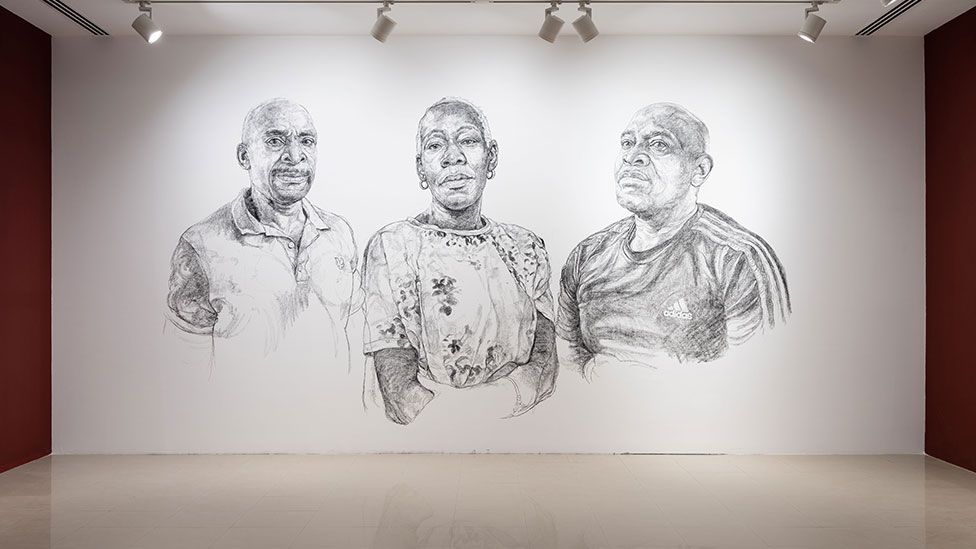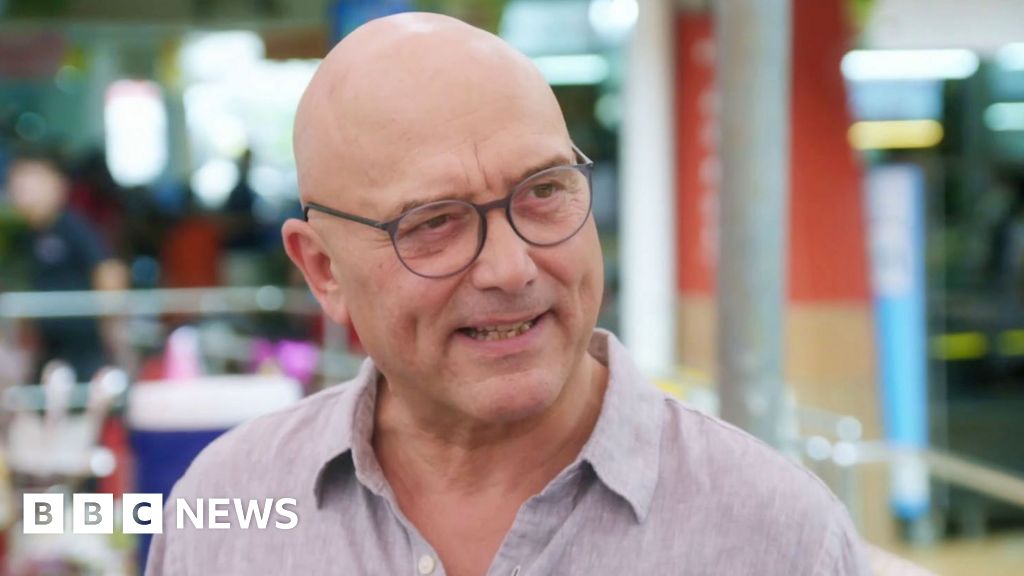ARTICLE AD BOX
 Image source, Danko Stjepanovic
Image source, Danko Stjepanovic
Barbara Walker's Burden of Proof explores the effect of the Windrush scandal on individuals and families
By Nichola Rutherford
BBC News
The Windrush scandal and the effects of the pandemic are among the issues explored by the artists shortlisted for this year's Turner Prize.
Barbara Walker, Rory Pilgrim, Ghislaine Leung and Jesse Darling are in the running for the prestigious art award.
Their work ranges from installations of manipulated household goods to a seven-song oratorio.
They will be displayed at the Towner Eastbourne, East Sussex from September, with the winner announced in December.
Alex Farquharson, the director of Tate Britain and chair of the Turner Prize jury, told BBC Radio 4's Today programme the artworks shared common themes.
"They deal with a number of different social issues as well as social structures that perhaps risk confining and restricting life, almost taking freedom away in some cases," he said.
"At the same time I think that there's a remarkable sense of empathy and sensitivity and the human running through that in relationship to those social issues."
Here is a brief overview of the nominees and their work.
Jesse Darling
Image source, Ben Westoby/ Modern Art Oxford
Image caption,No Medals, No Ribbons highlights how systems of power can be as fragile as living things
Oxford-born Jesse Darling works in sculpture, installation, video, drawing, sound, text and performance to explore and reimagine the everyday technologies that represent how people live.
The 41-year-old, who now lives in Berlin, has been nominated for his solo exhibitions No Medals, No Ribbons and Modern Art Oxford and Enclosures at Camden Art Centre.
The jury was struck by Darling's ability to manipulate materials in ways that express the messy reality of life.
They felt that these exhibitions revealed the breadth and integrity of Darling's practice, exposing the world's underlying fragility and refusing to make oneself appear legible and functioning to others.
Image source, Eva Herzog
Image caption,Darling's Ennclosures references the historic Inclosures Act, by which the common lands of Britain were made private property by a ruling class
Ghislaine Leung
Image source, GRAYSC
Image caption,A ventilation system removed from a bar was reinstalled in the exhibition and fixed from the floor
Ghislaine Leung's solo exhibition Fountains at Simian, Copenhagen, tests the boundaries of the gallery space.
Baby monitors, child safety gates, inflatable structures, toys, and water fountains are used to turn the exhibition structure on its head, asking questions about time, leisure, and labour.
It also includes a wall painting the size of the artist's home studio wall divided into all the hours of the week. The portion of studio hours available to the artist is marked in black.
It shows the realities of Stockholm-born Leung's multiple roles as an artist and a mother. She is 42 and lives and works in London.
The jury commended the warm, humorous, and transcendental qualities that lay behind Leung's work, as well as her commitment to challenging the way art is produced and circulated.
Image source, GRAYSC
Image caption,Leung's artwork shows her studio hours are from 09:00 until 16:00 on Thursdays and Fridays
Rory Pilgrim
Image source, Matthew Ritson
Image caption,RAFTS was performed at Cadogan Hall in London
Bristol-born Rory Pilgrim is a multi-disciplinary artist working across a wide range of media including song writing, composition, films, texts, drawings, paintings and live performances
He has been nominated for the Turner Prize for the commission RAFTS at Serpentine and Barking Town Hall, and a live performance of the work at Cadogan Hall in London.
He worked with local communities in Barking and Dagenham to create stories, poems, music and film reflecting on times of change and struggle during the pandemic.
It was made during the pandemic, with Pilgrim, 35, positioning the raft as a symbol of support keeping people afloat in challenging and precarious circumstances.
The jury praised the project as a standout example of social practice.
Image source, George Darrell
Image caption,It involved the collaboration of the local community in Barking and Dagenham
Barbara Walker
Image source, Danko Stjepanovic
Image caption,Portraits of those affected by the Windrush scandal are layered over reproductions of identity papers
Barbara Walker grew up in Birmingham to Jamaican parents and her work is concerned with the issues of class and power, gender, race, representation and belonging.
She has been nominated for Burden of Proof, which looks at the individuals and families affected by the Windrush scandal.
It featured large scale charcoal portraits drawn directly onto the gallery wall and eight framed works on paper.
Portraits of people affected by the scandal are layered over hand drawn reproductions of identity papers - documentary evidence of their right to remain in the UK.
The jury applauded Walker's ability to use portraits of monumental scale to tell stories of a similarly monumental nature, whilst maintaining a tenderness and intimacy.
Image source, Danko Stjepanovic
All the shortlisted artwork will go on display at Towner Eastbourne from 28 September until 14 April as part of the gallery's centenary celebration.
The winner will be awarded £25,000 with £10,000 awarded to the other nominees.
The Turner Prize winner will be announced on 5 December 2023 at an award ceremony in Eastbourne's Winter Gardens.

 2 years ago
87
2 years ago
87








 English (US) ·
English (US) ·